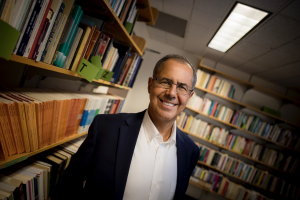Rafael Fernandez de Castro: Encouraging International Integration

He’s not entirely settled into his new office yet, but Rafael Fernandez de Castro, the recently-appointed Director for the UC San Diego Center for U.S.-Mexican Studies, is ready to take on the new role.
His picture frames sit neatly on the floor waiting to be hung and Fernandez de Castro jokingly shares he recently passed his driver’s license exam, “I thought it was very difficult but I passed fortunately,” he said and laughs.
Fernandez de Castro left his life in Mexico to direct the center, which he refers to as the most important U.S.-Mexico studies center out of all universities in the United States.
The Center for U.S.-Mexican Studies is a policy research institution at UC San Diego’s School of Global Policy and Strategy. It is a source of research for the creation and implementation of public policy and has one of the largest residential fellowship programs in the U.S. for research on Mexico.
“I am convinced that there is no other center of studies in the United States that has generated so much knowledge,” Fernandez de Castro said. “It has accumulated so much knowledge about Mexico and the relationship between Mexico and the U.S.”
It is during an interesting political time that Fernandez de Castro is taking on this new role. As prototypes of the border wall are going up in San Diego and immigration policies are being discussed, there is inevitable integration occurring between the U.S. and Mexico especially in the San Diego-Tijuana region, according to Fernandez de Castro.
“Mexico and the U.S. are integrating independently from the will of Washington and Mexico City,” he said. “What we can do in this center is generate ideas, generate proposals, so that precisely that process of integration can be easier.”
He said this “independent integration” was obvious after San Diego and Tijuana worked together to send aid to Mexico City after it was struck by an earthquake on Sept. 19.
“The truth is that it makes me optimistic because beyond the will of politicians, it is very clear to me that people in the U.S. and people in Mexico and especially (people) at the border perfectly understand the value of cooperating,” he said. “They understand perfectly that there is value in coordination, they understand perfectly that we have a shared present and future.”
There are several challenges that he sees ahead because the relationship between both countries is very complex and there are many prejudice ideas from both sides but he is determined to insist on more interaction.
Fernandez de Castro found his passion for studying the relationship between the two countries early in his career when he completed an internship in Washington with politician Henry Barbosa Gonzalez.
He then decided then and there to dedicate his work both at an academic level and government level to the U.S.-Mexican relationship.
Originally from Mexico City, Fernandez de Castro moved to Austin, Texas to pursue his master’s in public policy. Then acquired his doctorate in political science at Georgetown University.
Fernandez de Castro has served as the foreign policy adviser to former Mexican President Felipe Calderon and was the founder and former chair of the Department of International Studies at Mexico City’s Instituto Tecnológico Autónomo de México (ITAM).
Now, as the director of the center at UCSD, his goal is to make the center well known and make it a place where ideas can be generated to facilitate the cooperation between Mexico and the U.S.
“As an academic, I want to add my grain of salt to insist that if we cooperate, Mexicans and Americans, we can have a better future,” Fernandez de Castro said.






